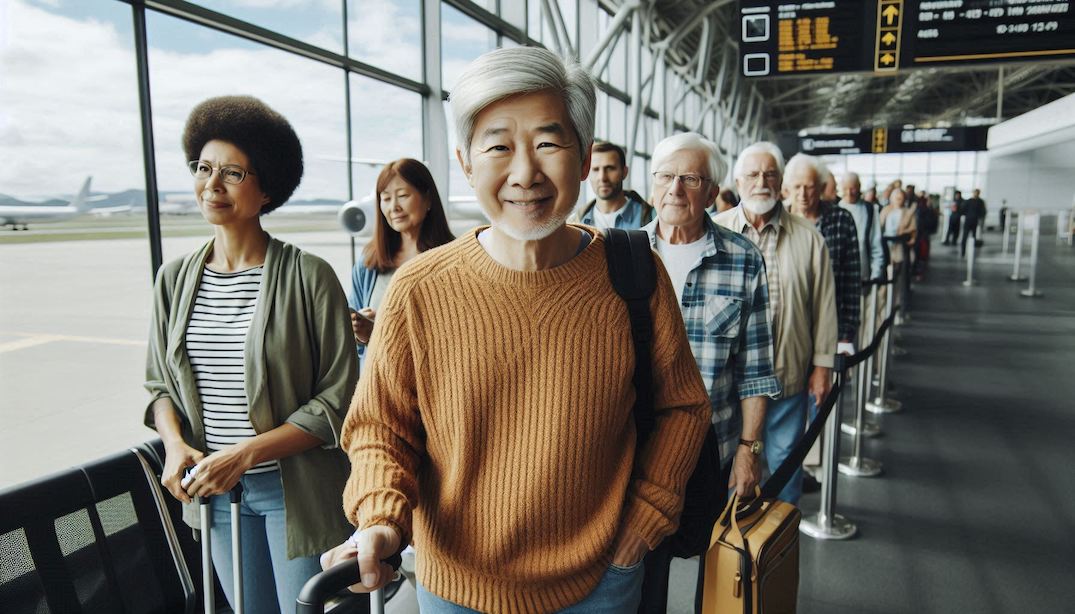
Here are some practical tips to help ease jetlag when traveling across time zones, along with suggestions for items to bring, foods and drinks to consume, and actions to take upon arrival:
Before and During Your Flight
- Adjust Your Schedule Early:
- Gradually shift your sleep and meal times to match the destination time zone a few days before departure.
- Items to Bring:
- Eye Mask and Earplugs: Help you sleep more soundly by blocking out light and noise.
- Neck Pillow: Provides comfort for better rest on long flights.
- Melatonin Supplements: A small dose an hour before you plan to sleep can help regulate your body’s sleep-wake cycle.
- Stay Hydrated:
- Water: Drink water regularly and avoid alcohol and caffeine, which can dehydrate and disrupt sleep cycles.
- Herbal Teas: Chamomile or peppermint teas promote relaxation, especially if you need to rest during the flight.
- Eat Light, Nutritious Meals:
- Opt for easily digestible, low-sugar meals with lean protein and complex carbs (e.g., chicken salad or oatmeal with fruits).
- Pack healthy snacks like nuts or whole-grain crackers to avoid overly processed, sugary snacks served on board.
- Move and Stretch:
- Walk around the cabin periodically, and do light stretching exercises to boost circulation and keep energy levels stable.
Upon Arrival
- Stay Awake Until Local Bedtime:
- Resist the urge to nap. Try to stay active, ideally outdoors, to reset your internal clock to the new time zone.
- Sunlight Exposure:
- Natural sunlight is crucial for helping your body adjust to the new day-night cycle. Spend time outdoors as soon as possible, even on a cloudy day, to signal your body that it’s daytime.
- Light, Balanced Meal:
- Have a balanced meal containing lean protein, complex carbs, and veggies to energize without overwhelming your digestive system.
- Short Evening Stroll:
- If you’re feeling sluggish, a short evening walk can boost your energy, help release endorphins, and make falling asleep easier at night.
- Avoid Caffeine and Alcohol:
- These can disrupt sleep, especially on the first night, so it’s best to skip them until you’re well-adjusted to the time zone.
- Chamomile or Lavender Tea Before Bed:
- These herbal teas promote relaxation and are an excellent natural sleep aid, helping you wind down after a long journey.
-Tuổi Hạc-
Here are some reputable resources to help you dive deeper into managing jetlag and adjusting to new time zones:
- Mayo Clinic: “Jet Lag Disorder”
This article covers causes, symptoms, and treatment options for jet lag, along with detailed tips for before, during, and after travel.
Mayo Clinic – Jet Lag Disorder - National Sleep Foundation: “How to Avoid Jet Lag”
This guide includes scientific insights on circadian rhythms, advice on adjusting sleep schedules, and travel tips for reducing jet lag symptoms.
National Sleep Foundation – Avoiding Jet Lag - Centers for Disease Control and Prevention (CDC): “Healthy Travel”
The CDC provides resources on safe and healthy travel, including hydration tips, food choices, and general wellness strategies.
CDC – Healthy Travel - Harvard Medical School – “Taking the Hell Out of Jet Lag”
This Harvard article discusses the science of jet lag, tips on acclimating to new time zones, and factors like light exposure, hydration, and nutrition.
Harvard Health – Jet Lag - Sleep Foundation: “Melatonin and Sleep”
A guide to understanding melatonin’s role in sleep, including when and how to use melatonin supplements effectively during travel.
Sleep Foundation – Melatonin and Sleep
